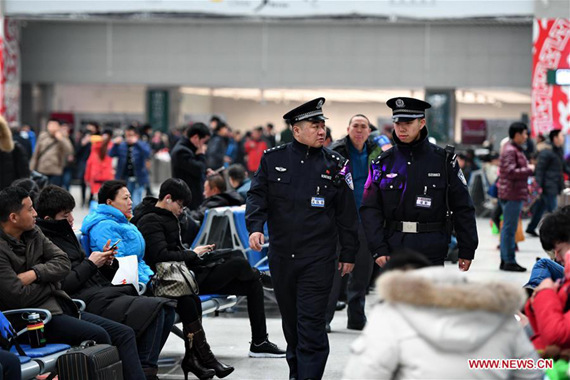
Police officers Gao Yang (C-L) and Nie Yingjie (C-R) patrol at the Changchun Railway Station during Spring Festial travel rush in northeast China's Jilin Province, Jan. 26, 2017. (Xinhua/Zhang Nan)
Spring Festival is the most important festival in China, and while the event centers around time spent with the family, this is not the case for everyone.
LONELY FESTIVAL
Xiao Liang, 13, was inconsolable when he was told that his parents would not be spending Chinese New Year with the boy and his grandparents, in Wenxi County, Shanxi Province.
The decision by his parents, who work in factories in east China's Jiangsu Province, was not taken lightly, as they knew how sad it would make their son. Last year, he traveled to Jiangsu, but they only had a few days off this year and the journey would have been long and arduous for the boy.
"Two days ago, I dreamed of my father and mother returning home and together going to visit my aunt," he said.
Luckily for him, even though his parents will not be around, he has plenty of friends and things to do at the local Children's Center, which was set up to care for left-behind children just like him.
Another event for left-behind children was a party in Hohhot, capital of Inner Mongolia Autonomous Region, where the children attended activities and were presented with gifts.
In China, it is common for migrant workers who go to cities to leave their children in the care of grandparents. Spring Festival is one of the few opportunities that families can be together.
BUSY WORKERS
It is the busiest season for railway staff given how many people travel during Spring Festival.
"I feel guilty when I think of my family," said Liu Tiejun, 28, a dispatcher at southwest China's Chongqing city North Railway Station. His wife and one-year-old son live in Shandong Province.
Due to his work commitments, he has not spent the last four Spring Festivals with his family. "But I feel happy to be helping others to go home," he said.
Many delivery workers also cannot go back home for the festival.
After a busy and tiring day, Yan Yong, a courier in Beijing, submerged his freezing hands in a basin of hot water.
This was the sixth Spring Festival that he has been away from his family, who live in Sichuan.
"My company encourages us to invite our family to Beijing for the festival. But my wife has to care for my parents, so I am alone," he said.
HAPPY NEW HOME
In a village in Xigaze, southwest China's Tibet Autonomous Region, Wangdron, prepared "gutu," doughy meat porridge, for a special dinner to celebrate the local New Year, which coincides with Spring Festival.
"We had a joyful New Year and will work hard to ensure a more prosperous life," said the Tibetan woman, who is head of the village.
The villagers moved here in 2003 as part of a poverty reduction program. Last year, 14 out of 21 underprivileged households in the village shook off poverty thanks to job opportunities brought by construction projects.
"Our lives are much better than before," said Wangdron, who has plans for a Tibetan handicraft factory and green houses. She was confident that the remaining seven families will be lifted out of poverty this year.
NEW LIFE FOR OLD FOLK ART
As Chinese enjoy a modern and prosperous life, folk art is seeing a resurgence.
"This year, we sold 10,000 desk calendars with double roosters and thousands of paper-cuts," said Zhang Duotang, a master of the traditional paper-cutting art in Guangling, Shanxi.
The art has been handed down over generations in Guangling.
"This year is the Year of the Rooster, or 'ji' in Chinese. Ji is a homonym of another Chinese character meaning 'auspicious'," said Zhang.
He designed dozens of rooster paper-cuts with the help of the Internet. "They are very popular among the younger generation," he added.
Chinese Lunar New Year, which this year is the Year of the Rooster, began Saturday.


















































